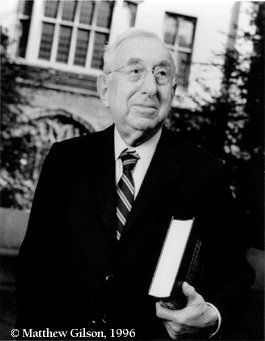 The University of Chicago Magazine February 1996
The University of Chicago Magazine February 1996
Joseph Kirsner at 86

Some people spend their lives wondering what they will be when they grow up. Joseph Kirsner, the Louis Block distinguished service professor in medicine, made that decision when he was 9 years old. At 86, he still follows his chosen path with the tireless commitment of a much younger man, walking to his office at 6:30 every morning after only six hours of sleep, then putting in a full day of seeing patients, teaching, and writing.
Those busy days now add up to 60 years as a member of the University's faculty; years in which Kirsner, PhD'42, has helped transform his specialty of gastroenterology from an art-in his words, "speculative, impressionistic, anecdotal, almost mystical at times"-into a science. The author of nearly 700 publications, including 14 textbooks, Kirsner has trained more than 200 of the field's leading specialists. Winning almost every major award in his field, he has even had one named in his honor: the American Gastroenterological Association gave its first J. B. Kirsner award for excellence in clinical gastroenterological research in 1990. And a grateful patient, Martin Boyer, established a U of C chair in Kirsner's honor.
Kirsner built his distinguished career from humble origins. The son of Russian immigrants, he held multiple part-time and summer jobs throughout his school years and then worked his way through a six-year program at Tufts University that combined college and medical school.
"My thought was to go through medical school as quickly as possible and start earning a living," he recalls. Kirsner graduated near the top of his class and came to Chicago in 1934 to begin an internship at Woodlawn Hospital at a salary of $25 a month.
He began attending lectures at the University, and was especially impressed by the late Walter Palmer, SB'18, SM'19, MD'21, PhD'26, who in 1927 had established the first academic gastroenterology unit in the United States. Intrigued with academic medicine, Kirsner applied for a position. In 1935, when a faculty member left unexpectedly, he was invited to join the staff as "assistant in medicine."
"It was made very clear that we were to become involved in research," Kirsner says. "Before I knew it, in 1937, I was enrolled in a Ph.D. program."
His early research involved the study of peptic ulcers and the effects of antacids on stomach- acid secretion and body chemistry. It led to one of the most unusual and most productive doctor-patient relationships in history. A penniless, homeless, young man-known to gastroenterologists as Edwin R.-enrolled in one of Kirsner's research studies. Edwin badly needed treatment. He also needed a job and a place to live, so Kirsner kept him hospitalized for an entire year as a research subject and trained him as a technician.
"It would be difficult to gain approval for such an arrangement today," Kirsner acknowledges, even though none of the experiments posed any threat, "but it was acceptable to him, and he helped me start some of my research. Everybody was happy."
In the late 1930s, Kirsner turned his attention to the inflammatory bowel diseases: ulcerative colitis and Crohn's disease. Working initially with Palmer, Kirsner developed new methods to manage IBD patients. In the 1940s, his studies demonstrating the unanticipated levels of protein loss in patients with even mild IBD placed new emphasis on the importance of nutrition. He developed animal models of IBD, demonstrated the influence of immunology and genetics, and recognized the increased risk of colon cancer in patients with IBD.
Kirsner has also made it possible for others to expand on his research, raising funds for gastrointestinal studies nationwide. In 1962, a collection of his grateful patients joined in by forming the Gastro-Intestinal Research Foundation, which has provided enormous support for gastrointestinal research at the University.
GIRF, as the foundation is known, "is not in the same league as the National Institutes of Health in terms of financial resources," Kirsner says, "but we can give critical amounts of money to unexpected developments-something you can't expect with NIH or other foundation funds. That was a key in the growth of this department." In 1984, the foundation raised more than $2 million to construct the University's 17,000-square-foot Joseph B. Kirsner Center for the Study of Digestive Diseases.
Kirsner insists that having his name on a productive laboratory or a prestigious award is nice, but not half as important as his dealings with people: his students and his patients.
"You can write a lot of papers and do a lot of studies," Kirsner says, "but I like to think that our best contribution has been the training of young men and women."
And the most rewarding task? "Taking care of patients, making rounds-being able to help people. I really can't think of anything more satisfying than that."-John Easton
Photographs from campus:
Plus items For the Record.